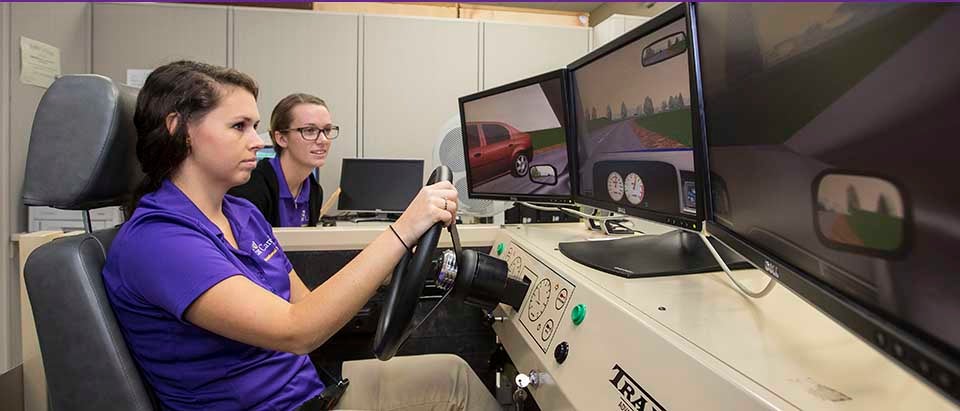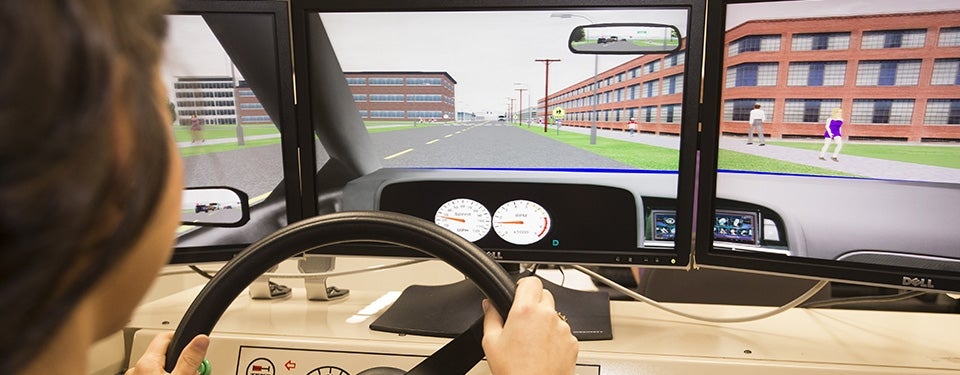GEARING UP
Students teach driving skills to teens with autism
A driving program developed by East Carolina University graduate students is steering some local teens with autism toward greater independence.
When five students in the Department of Occupational Therapy went looking for resources this spring to help teens with autism become more independent, they found precious few. So they took action and created a week-long “boot camp” to help teenagers with high-functioning autism learn to drive.
Their first class of teens completed the program this summer and their experience continues to deliver results.
“Up until 20 years ago, there was this idea that kids with autism couldn’t be as functional (as other children), and they can be,” explained Dr. Anne Dickerson, professor of occupational therapy and expert in mobility skills. “We want to recognize that they do have potential to perform these skills.”
“Although (teens with autism) are very capable, they still need the proper resources made available to them,” said student Rebecca Case.

ECU students Kalyn Kaminski, left, and Danica Motuz use the touchscreen board designed to help improve eye-hand-foot coordination by training users to respond effectively to multiple stimuli.
Case said that research she conducted with four other students – Kalyn Kaminski, Danica Motuz, Carina Norris and Danielle Ozment – turned up very little support for driving instruction for special populations.
“We hoped this project would get the ball rolling in this area of research,” she explained.
They began the boot camp by assessing each teen’s driving abilities and setting specific goals for improvement. Because many of the teen participants had no previous driver education, they started with the basics: how far a driver should sit from the steering wheel, how high the headrest should be, how to check mirrors before moving, and how one’s feet should rest on the gas and brake pedals.
An interactive computer program helped participants improve their eye-hand-foot coordination by measuring reaction time to audible cues. They also used a large, touchscreen board where lights challenged them to divide their attention and respond to multiple stimuli. And there’s the driving simulator.
“Crashing” in the simulator doesn’t have physical consequences, but it can have cognitive impacts. One mother said she had frequent conversations with her son about the need to regularly take his medication until a “crash” at the boot camp – caused by his failure to see another car – convinced him he needed the medication to improve his focus.
They also received lessons on traffic markings and laws specific to North Carolina.
“He’s going down the road, calling out signs here, there and everywhere,” remarked another mother. “I love it. He got a lot out of it and I’ve gotten a lot out of it.”
“The most I got out of the boot camp was confidence in my own driving abilities and being able to discern…what a lot of the different traffic signs mean,” said Patrick Davis, 19. “And just being a safer driver in general.”

ECU students and participants in the boot camp include, front row left to right, Timmy Peadon, David Jenkins and Patrick Vallandianham; center row left to right, Joshua Smith and Sean Ketoff; and back row left to right, Kalyn Kaminski, Jack Cullen, Danielle Ozment, Patrick Davis, Canna Norris, Danica Motuz and Rebecca Case. (Contributed photo)
There were also options for those not ready to drive. Community mobility exercises taught participants to navigate the ECU and Greenville transit systems. One lesson required the teens to plan a trip to Washington, D.C., using buses, trains, taxis and the metro system.
“Ultimately, we are trying to get them as independent as possible to access the community,” said Dr. Jennifer Radloff, assistant professor in occupational therapy.
“I really got a lot of fulfillment out of doing this project,” Case said. “We got to see the results and see how it changed their lives.”
“These students have done a phenomenal job with the participants,” Dickerson added. “I’m not sure we could have asked for students more engaged than we have had. I was truly amazed by the gifts they have to work with these kids and the creativity they had to design the activities.”
Dickerson continues to hear positive feedback from parents whose children participated in the boot camp, including one mother whose son succeeded in earning his driver’s license in late October.
After the young man passed his tests – on the first try – his mother wrote Dickerson a note:
“The day after he got his license I asked him…what was most and least helpful from the boot camp. (He said) most helpful was the practice for reflexes, and least was navigation. Why navigation?
“He leaned forward in that patronizing teen way of talking to parents: ‘Mom, NO ONE reads maps anymore.’”
Dickerson hopes they will be able to offer the boot camp again next year.
The Department of Occupational Therapy is housed within the ECU College of Allied Health Sciences. More information about their programs is available at http://www.ecu.edu/ot/.
Pictured below, Danielle Ozment, right, instructs Rebecca Case on the driving simulator.
